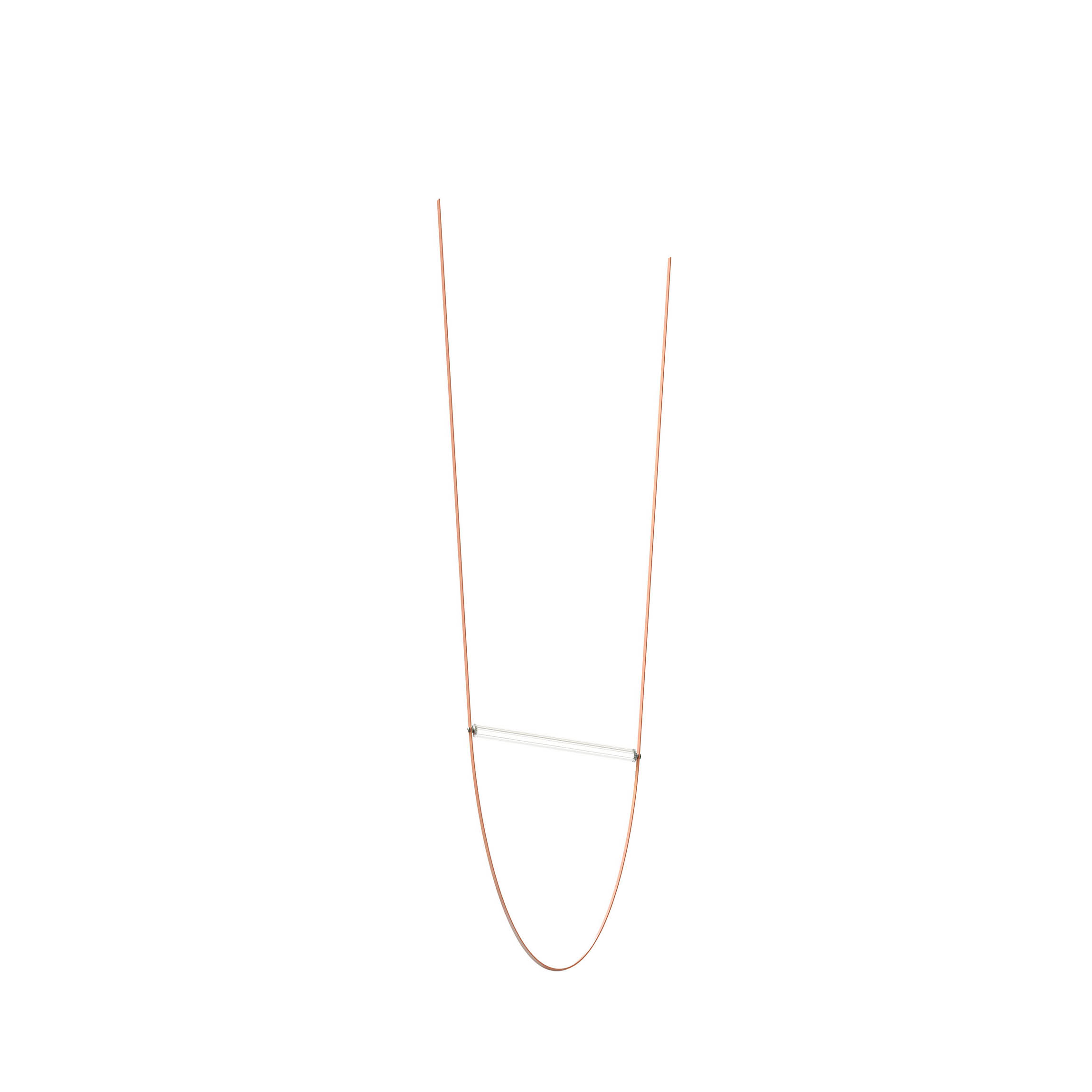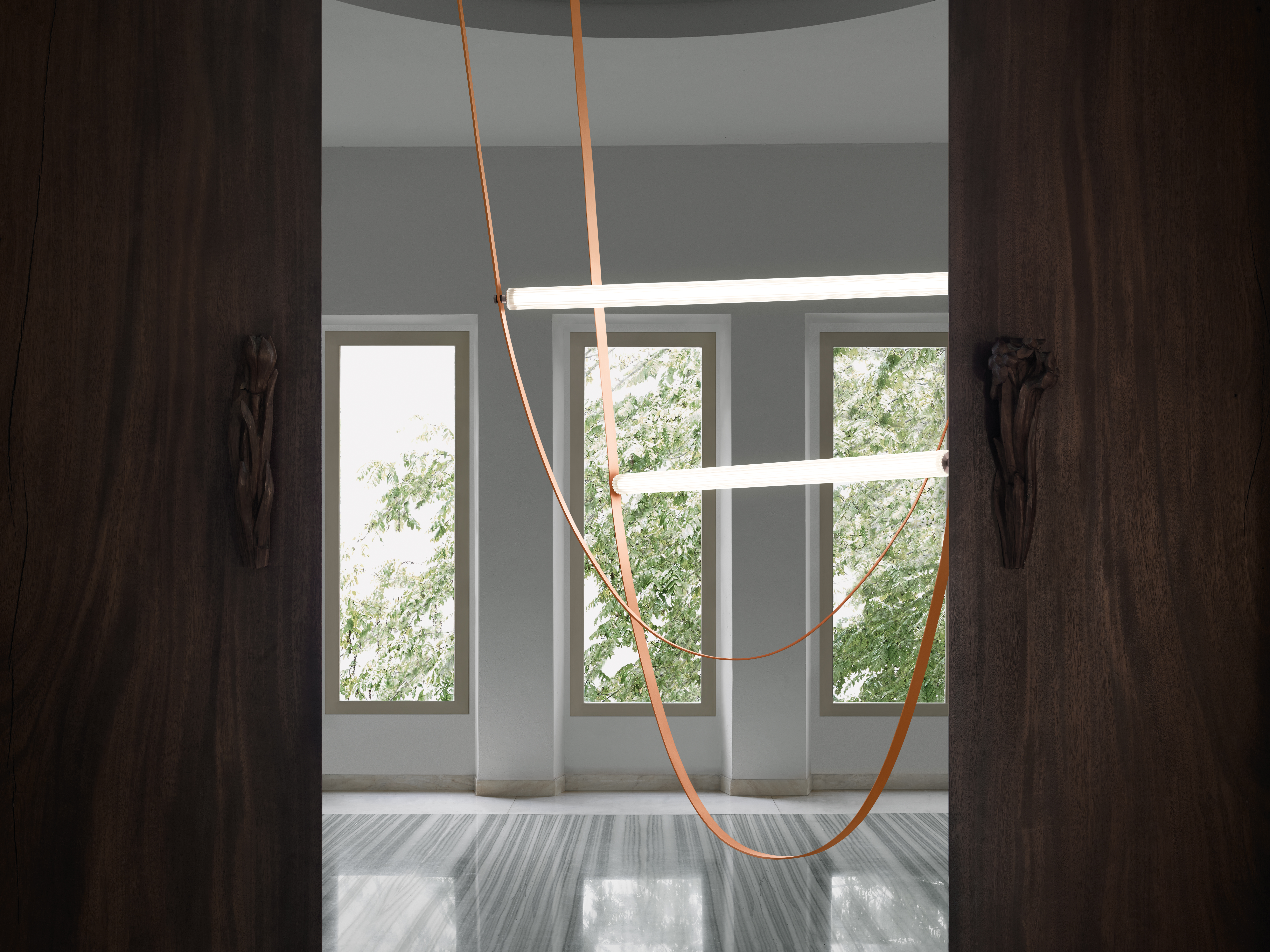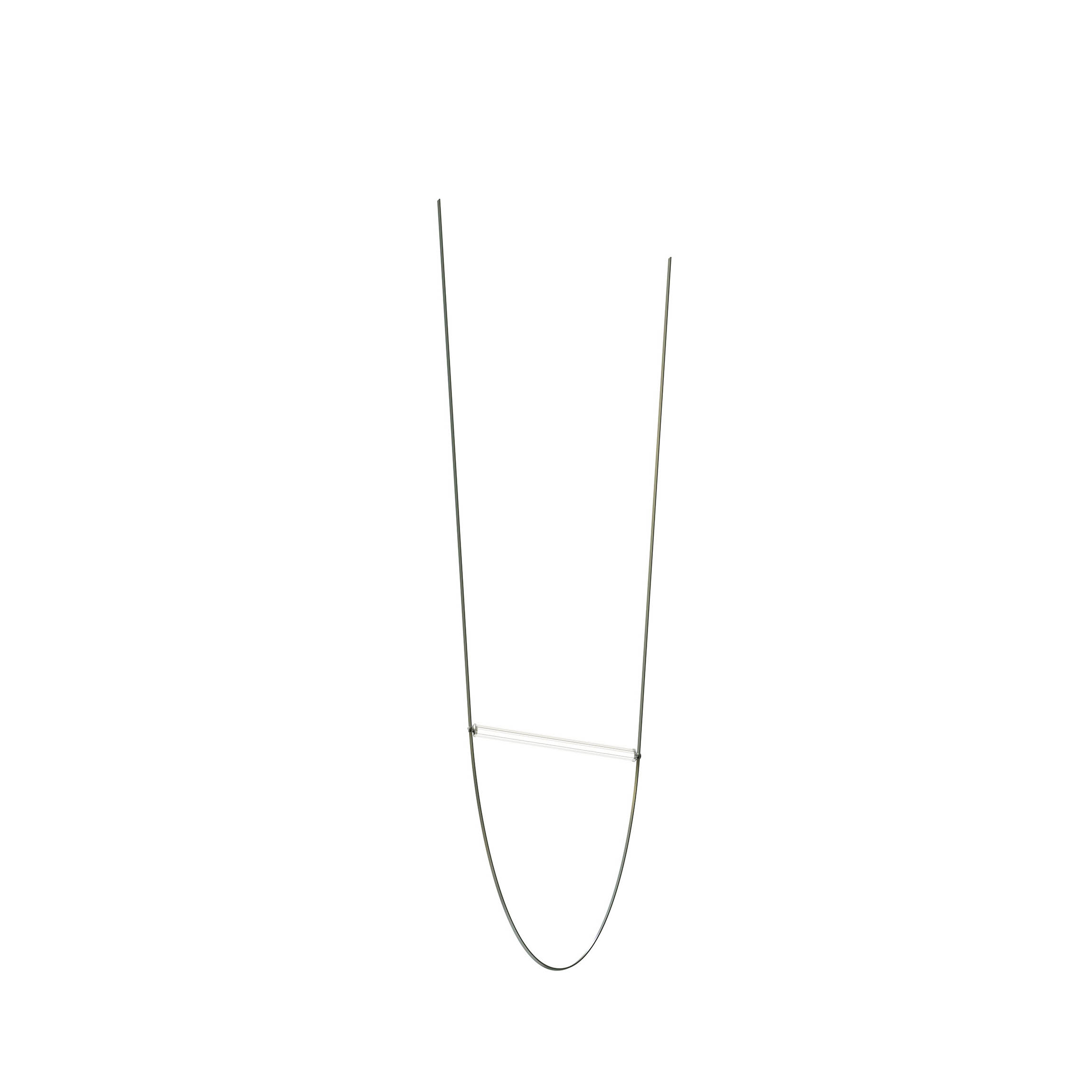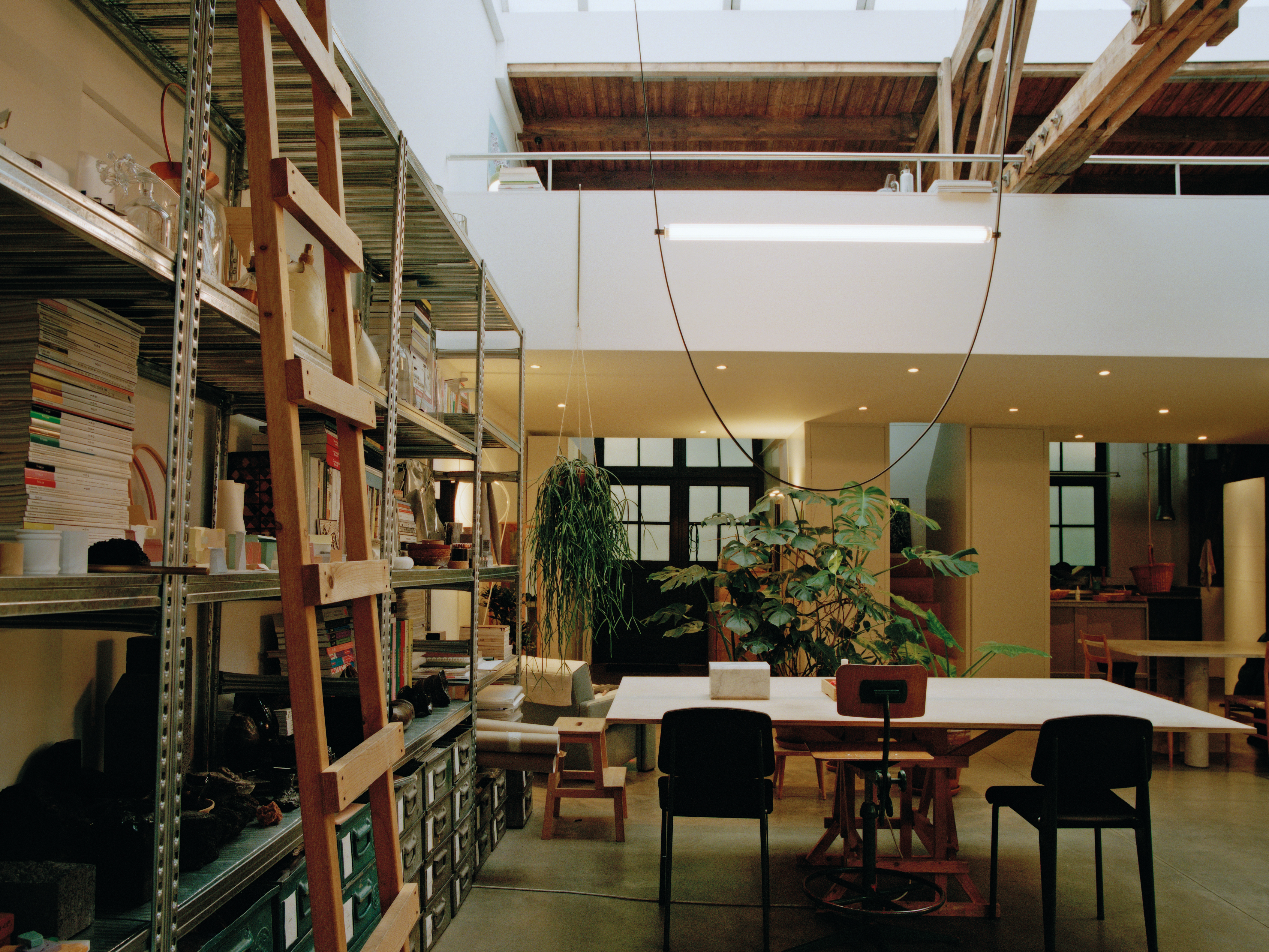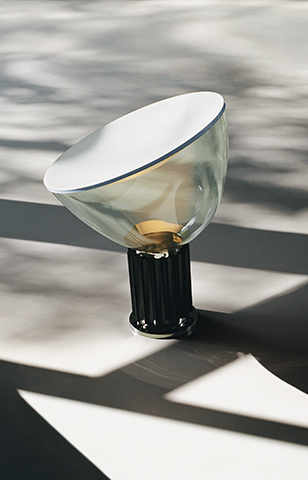Formafantasma and Wireline, from A to Z
Formafantasma’s Wireline sits somewhere between artistic expression and industrial design. Andrea Trimarchi and Simone Farresin’s latest creation for Flos represents their design ethos and aesthetic values, where functionality meets the unexpected. It’s a piece that neatly fits within the studio’s universe, where design, social responsibility and ecology collide. We weave this world through a vocabulary of ideas, concepts, places and things that matter to them.
Product Wireline - Designer Formafantasma - Interview by Rosa Bertoli - Photography Olya Oleinic
Amsterdam [/ˌæmstəˈdæm/] n. – the capital city of the Netherlands and the city where Studio Formafantasma is based. It’s the city we chose to live in, a city we like because it allows us to be isolated. It’s a white cube where we are free to think away from the noise of other design capitals.
Beauty [/ˈbjuːti/] n. – A combination of qualities, such as shape, colour, or form, pleasant to the senses and especially the sight. It’s a big taboo. We never think about [beauty] when we are working, but this doesn’t mean that our work doesn’t include that component. It’s actually the most intuitive part of what we do. It is there, but we don’t seek it.
Craft [/kɹɑːft/, ] n. – A traditional skill of making things by hand. A recurring element of Formafantasma’s work but also an entity they have been critical towards throughout their career. For us, craft represents an idea of quality. We have considered this theme from early on in our careers, starting when we were students and also approaching it from a critical point of view. We have wanted to analyze this theme from a point of view of our Italian background, it was important for us to discuss the contemporary role of craftsmanship. We are not exclusively interested in craft as a production method, but as an ideology. It’s an idea we have been exploring through projects such as Cambio and Ore Streams, analyzing the relationship between extraction of raw materials, their refining and the creation of objects.
De Natura Fossilium [/ˈdeː/ /naːˈtuː.ra/ /fos.si.li.əm’/] n. – 1. A scientific text written by Georgius Agricola in 1546, considered to be the first book on mineralogy. 2. A project by Formafantasma based on an investigation into the culture of lava in Sicily’s Mount Etna and Stromboli, two of the last active volcanoes in Europe. It’s one of many projects by the designers linked to Sicily. This project offers a fitting example of our love for material experimentation. It’s a project that looks at Mount Etna as a space for production, developing a theme of production as an intimate relation with a place. We used volcanic ash, therefore manufacturing with a material that wasn’t extracted but expelled from the volcano. The volcano is like a mine with no miner.
Eindhoven [/ˈaɪndhəʊvən/] n. – A city in the North Brabant province of The Netherlands, home to the Design Academy where the designers studied, and originally started their studio. One of the places we admire the most in Europe: we admire the courage of this city, which has always been the country’s ugly duckling. It’s a city with a strong desire to reinvent itself, to adapt to the contemporary by investing in its future and putting design at the centre of its economic, cultural and urban development. It’s a city that uses design as a pathway to dignity and future, and the proof that a discipline traditionally considered at the service of styling, can do much more.
Formafantasma [/ˈfoːr.ma.fənˈtaz.mə/] n. – 1. Lit. Ghost form. 2. The name chosen for the studio. It’s a programmatic name. People often think it means ‘fantastic form’, but it actually has the opposite meaning: it means absent form. What we want to convey is that even though our projects are usually formalized with interesting aesthetic results, they come from a process of research that’s not like a romantic idea of a designer sitting at a table and drawing, but it’s a more complex process. We asked ourselves: if we had a studio, what would we like to call it? We wanted to give the idea of a changing form, that allows us to explore different things.
GEO–design [/ɡjəʊ – dɪˈzaɪn/] n. – a master course at the Design Academy Eindhoven, developed from an initiative by Academy creative director Joseph Grima and an exhibition platform curated by Martina Muzi. Andrea Trimarchi and Simone Farresin are heads of the GEO–Design master course. The GEO–Design department puts forward transformative design proposals based on the analysis or the structure upon which design performed. The course obviously has a strongly ecological concern that acknowledges the importance and the relevance of industrial production, but also acknowledges just how this contributed to environmental disaster and sees design as an opportunity to criticise, to analyse but also to rephrase and rethink the way design performs, for whom,including also the needs of non humans, and taking care of the understanding of how materials are sourced or distributed and processed on a global scale.
History [/ˈhɪst(ə)ɹi/] n. – past events considered together, especially events of a particular period, country, or subject. We always say, ‘look back to look forward’, it’s been our motto from the start. It’s impossible to design the future without looking at what happened before, it’s a knowledge one must have to design. All of our projects have started from a historical research. It’s an interest and an attitude that we have, and we think it’s relevant because it helps us to comprehend our position within the discipline and the contemporary.

Italiani [/i.taˈlja.ni/] adj. – Italians. We feel Italian, without any doubt. But we think we are also very european. Italy is a place we miss, a lot. We dream to one day be able to be partly based there, too.
Joanna Piotrowska [/ˌdʒoʊˈænə/ /pʲɔˈtrɔf.ska/] n. – a Polish artist and photographer, based in London. Her work is beautiful but also discomforting which is always good.
Kanazawa [/ka̠na̠za̠ɰᵝa̠/] n. – Japanese city. The capital of the Ishikawa Prefecture, on Honshu Island. A small city in Japan, which we visited in spring 2020. Cherry trees were all blooming and it was a bit of a Japanese cliché but also extremely beautiful.
Light [/laɪt/] n. – the brightness that comes from a natural source or an electrical device, and that allows things to be seen. Light is our theme. Every author has an obsession, and light is ours. We have explored it as a studio and then with Flos with Wirering and now Wireline. We like that it’s intangible, but also technical and emotional – we really like this double component. It’s also one of the only fields of design where there has been an important technological innovation: LED revolutionized everything. Lighting is the most exciting sector of design.
Materials [/məˈtɪəɹɪəlz/] n. pl. – physical substances that things can be made from. Throughout their career, Formafantasma have experimented with materials such as volcanic ash (see: De Natura Fossilium), electronic waste (see: Ore Streams), leather, wood and more. We have an intuitive, cerebral relationship with materials. Since the start of our career, we have been very hands on with materials, and carried out material experimentation with projects such as De Natura Fossilium, but also Botanica, and more. It has become an increasingly precise obsession for us, as we believe that it’s extremely important for designers to explore the origin of materials, how they are processed and distributed, so that the design discipline can be pushed forward. We are very aware of the relationship between designing objects and where the raw materials are from.

Nature [/ˈneɪtʃə/] n. – all the animals, plants, rocks, etc. in the world and all the features, forces, and processes that happen or exist independently of people. No designer can ignore the current ecologic crisis, and no designer can avoid a reflection on this theme. Design can become one of the main assets in the fight against climate change, and we try to do this through our work as a studio and in our collaborations with companies. It’s important to bring this conversation and attitude within companies.
Ore Streams [/ɔɹ/ /stɹiːmz/] n. pl. – 1. lit. a flow of rocks or soil from which metal can be obtained. 2. A project initiated by Formafantasma in 2017 and developed over three years, presented as ‘an investigation into the recycling of electronic waste’. Ore Streams has been an incredibly important project for our studio; it’s the project that has changed our way of working, a turning point where the research component of our work (which was more material based before) had turned into activism, to understand how design can bring change, analizing the entire design and production system holistically. We think this attitude of giving a second life to electronic waste can be applied to the industry, and it’s a process we hope to also work on with Flos one day.
Plants [/plɑːnts/] n. pl. – living things that grow on earth, in water, or on other plants. Usually composed of a stem, leaves, roots, and flowers, and producing seeds. We explored our fascination for the vegetal world through the exhibition Cambio, specifically dealing with trees and extraction of timber from forests, to better understand the ecological impact of the wood industry. It’s been an incredibly important journey for us, because it made us see plants not like a resource, but as living creatures. And as designers, we reached the realisation that what you’re dealing with are living creatures, [and this] definitely has an impact on your way of working.
Quarantine [/ˈkwɒɹ.ən.tiːn/] n. – a specific period of time in which a person must stay isolated (in order to prevent the spread of a disease). Something experienced by most of the world due to the COVID-19 pandemic in 2020. Also intended as lockdown. The first time around, we almost found it a relief. We found it inspiring that the world could stop for a period of time. We have been lucky to have been safe during this time, that our families were well. Being isolated helped us think about how we do things, how we collaborate with the people in our studio and how we approach work in general. We realized that we don’t have to travel as much as we used to, that we can do more online, that we can collaborate virtually with companies. Silliness is not acceptable anymore. We have learned a lot from being quarantined and we know this time will have a long-term impact on people’s lives.
Routine [/ɹuːˈtiːn/] n. – a habitual way of doing things.
Since our home and our studio are in the same place, we need a routine to survive. We wake up at 7AM sharp every day, have breakfast, and walk our dog Terra for an hour. Then we work until 6.30 or 7PM, walk with Terra again and then have dinner. We cook for our team every day. We don’t work at night and go to sleep at 11.15PM. Our lights have a timer, switching on at 6.50AM every day, and off again at 11.15PM.
Sicilia [/siˈt͡ʃil.ja/] n. – the largest Mediterranean island, located off the toe of Italy’s boot. A historically and culturally rich region, also where Andrea’s family is from. Many of Formafantasma’s early works were connected to Sicily (see: De Natura Fossilium). It’s our big love. We always love to go back, it’s a special place, away from all the noise. It’s hard to explain why, but we just love it. Our works inspired by Sicily were often a reflection on the fact that Andrea knew it well, while Simone was still discovering it, so it was a process of discovery and rediscovery.
Terra [/ˈtɛr.ra/] n. – 1. lit. earth, Planet Earth. 2. The name of the couple’s Italian Greyhound. Our little, magnificent Italian Greyhound has been with us for seven months and he is our joy. He is a very special animal. He adapted to our rhythms, we are teaching him to live in our world and it’s really beautiful. We take for granted that an animal adapts to human life, but it’s actually a different species that is somehow trying to communicate with us. We found it moving when he first arrived, seeing the effort of this three-month-old creature who had a different species as its reference point.
Ugliness [/ˈʌɡli-nəs/] n. – the quality of being aesthetically unpleasant, or not attractive. Ugliness has a great potential, it’s what makes many things interesting. It’s a category of aesthetics, just like beauty, and its great disruptive potential shouldn’t necessarily be denied.

Vino [/ˈvino/] n. – wine (Italian). During lockdown, wine has become a daily habit. Being Italian, we also grew up with wine on the table. We like whites, both dry and fruity.
Wireline [/waɪə(ɹ)’laɪn/] n. – 1. lit. a long, thin mark made of a piece of metal thread that can be bent. 2. The name of Formafantasma’s latest lamp for Flos. In Wireline, the power cable becomes an essential design feature: flattened to resemble a rubber belt hanging from the ceiling, it holds a sophisticated, ribbed glass extrusion that contains an LED light source. Available in pink and forest green, Wireline can be installed as a single piece, or into a composition of multiples to obtain elaborate visual arrangements. Merging the worlds of industrial design and art installation through a juxtaposition of materials and shapes, Formafantasma designed it as a practical lighting tool, which reduces in size to be packed away. This is our second collaboration with Flos after Wirering (from 2018) and it’s an evolution of that idea on a completely different scale. The concept is based on a light source’s power cable becoming an important element in the shape, aesthetic and iconic and performative appearance of the piece in a space.

Xilarium [/sɪlˈaː.ri.um/] n. – also known as Xylotheque. A collection of authenticated wood specimens (latin). It is like a library, but of wood samples instead of books. We visited several during the research for our exhibition, Cambio. It is like visiting centuries of history written in the flesh of trees instead of paper pages.
Yeast [/jiːst/] n. – a type of fungus that is used in making alcoholic drinks such as beer and wine, and for making bread swell and become light. Who hasn’t made bread or pizza while on quarantine?
Zoom [/zuːm/] v. – 1. to move very quickly. 2. [Archi]zoom [Associati], design studio founded in Florence in 1966. Founding members were designers Andrea Branzi, Gilberto Corretti, Paolo Deganello and Massimo Morozzi. The group was instrumental in establishing the radical anti-design current in the 1960s and beyond. We did our bachelor degree in Florence. At the time, two of Archizoom’s founders taught there and for us the experience of being in contact with them and with their radical design has been a very formative, important moment for our work.




















